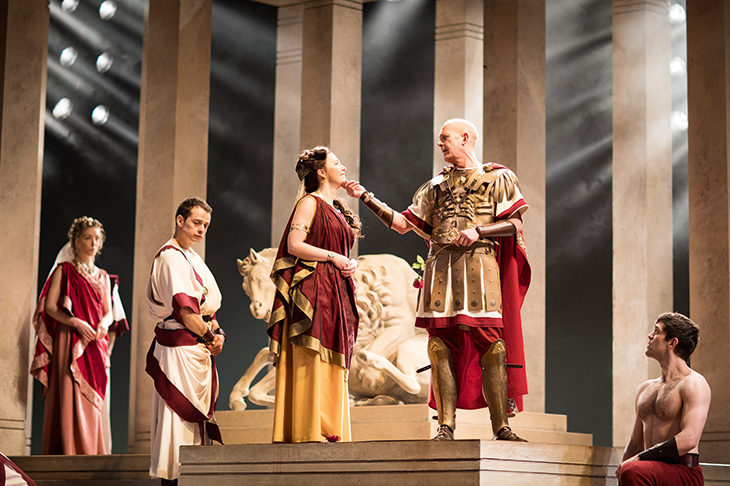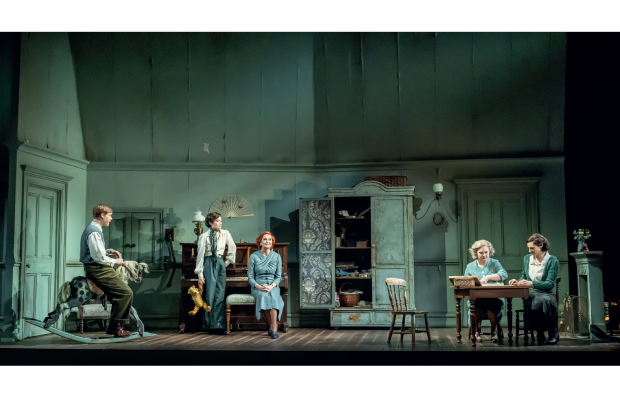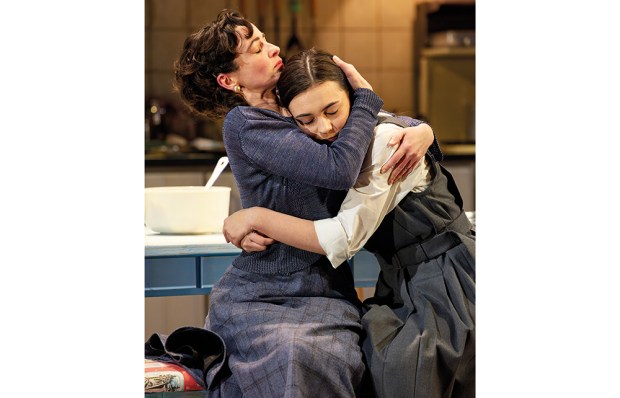Maximum Victoriana at the Old Vic for Matthew Warchus’s A Christmas Carol. Even before we reach our seats we’re accosted by bonneted wenches handing out mince pies. Merchants in top hats roam the aisles proffering satsumas, which they call, with accurate Victorian incorrectness, ‘oranges’.
The guts of the theatre have been ripped out for this show. A slender catwalk stretches 40 yards from the rear of the stage to the farthest wall of the auditorium, with the seats gathered around this runway in odd little clumps. The narrow performing area leaves no room for scenery, so Dickens’s London is suggested by dozens of oblong lanterns dangling overhead, like mini-Tardises, all glowing amber, as if recently nuked. Then a soapy blizzard starts. White suds flayed into aerated granules tumble down from on high and settle on our shoulders like plump drifts of snow.
At the heart of this visual feast is Rhys Ifans’s Scrooge. An easy choice for a popular thesp. It’s almost impossible to muff the role. It moistens the tear ducts of the Kleenex-prone, and it contains one of the most satisfying transformations in all literature. Facially, Ifans seems overly contemporary. His long blond hair is bolt-upright, like Boris Becker in the electric chair. His partially shaven jowls look a bit Woodstock, and he booms out his lines in a Home Counties wobbleboard voice that might be better suited to toffee commercials. He can certainly capture Scrooge’s emotions (both of them: aggressive nastiness and aggressive generosity), but his Welshness has gone missing, his sense of mischief, his elusive and sinuous naughtiness. By nature, Ifans is a bandit, an outlaw, not a religious convert.
In the early scenes he’s charming as an ambitious romantic with an eye for the ladies. He wins a job at a funeral parlour by correctly predicting how best to ‘prioritise’ two competing customers. (‘Prioritise’ was a rare departure from Victorian authenticity.) As he moves into finance, he finds his moral voice and declares that debt instils discipline. But when he sees the suffering caused by bankruptcy he suffers a full Rada breakdown: hunched shoulders, wracking sobs. It’s decent enough but unexceptional. Only at the end does Ifans shine through in his own colours. As Scrooge embraces virtue, he finds it deeply troubling. ‘I love Christmas,’ he yells, and then does a double take at his transformation. This is hilarious and true to the character. Less satisfying is the self-parodying note of the closing scenes. ‘I’ve always wanted to be called Brenda,’ says the Spirit of Christmas Present. This gets a laugh but it belongs to stand-up, not Dickens.
Julius Caesar is regarded as a dry, intractable and overly masculine play. I love it. The RSC’s version is made of the right stuff: togas, sandals, breastplates, ketchup and daggers, not guns. (No guns ever, please, in Shakespeare.) The casting is imperfect. Andrew Woodall finds something deliciously ogreish in the polished monolith of Caesar. Less convincing are his opponents Cassius and Brutus, a pair of revolutionary daredevils plotting to take over the world. Martin Hutson (Cassius) is a gifted comedian who can do exasperated prissiness as well as anyone. If the Beeb were remaking Some Mothers Do ’Ave ’Em, Hutson would head the list of possible Frank Spencers.
But Cassius is an elusive prize that requires craft and forethought. His rhetoric is captivating, magical, timeless. But as a person he’s prickly and small-minded, caustic and brittle, without cordiality or even humanity. Significantly, he receives no praise from any other character until he dies. Hutson is too shrill and his repertoire of hand gestures limited. And there’s a graver problem. Shakespeare knows that Caesar died aged 56 and he portrays Cassius as an embittered contemporary, steeped in long-marinated envy. Cassius recalls the conqueror of Gaul as a sickly and feeble junior officer in long-forgotten campaigns. But Hutson looks at least 15 years too young to have served alongside a youthful Caesar.
The role of Brutus is, if anything, trickier than Cassius. He’s a frosty and grandiloquent prig obsessed with his own virtue and with his ancient namesake who purged Rome of its early kings. In a word, Brutus is a family tree with a halo, but Alex Waldmann lacks the poise or substance to convey Brutus’s sense of his own magnificence. This void is filled by James Corrigan, who plays Mark Antony as a sexy, slippery and utterly ruthless political operator. He gives a convincing and natural shape to the funeral speech ‘Friends, Romans, countrymen’, which the audience greeted with chuckles of approval and a ripple of applause. And he included a tiny contemporary gesture. On that curious line, ‘I only speak right on,’ he added a characteristic Blairite motion with his fist, the hand loosely clenched, the thumb uppermost, thrusting forward. Subtle touches like that are a hallmark of fabulous artistry.
Got something to add? Join the discussion and comment below.
Get 10 issues for just $10
Subscribe to The Spectator Australia today for the next 10 magazine issues, plus full online access, for just $10.
You might disagree with half of it, but you’ll enjoy reading all of it. Try your first month for free, then just $2 a week for the remainder of your first year.














Comments
Don't miss out
Join the conversation with other Spectator Australia readers. Subscribe to leave a comment.
SUBSCRIBEAlready a subscriber? Log in